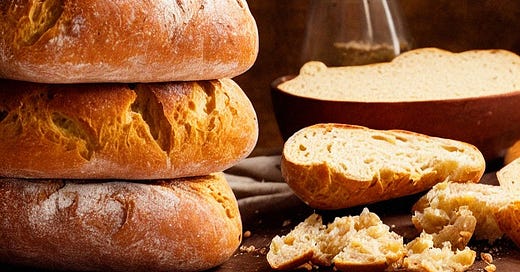The (True) Conspiracy of the Canadian Bread Cartel
Conspiracy, cartels - both are very strong words. Yet they’re necessary to describe the situation of bread in Canada. As a quick refresher, just a few months ago, the years-old bread conspiracy theory was revealed, with Canada Bread pleading guilty, and paying a $50 million fine. The price-fixing of bread - amongst other common groceries - has been going on for more than a couple decades. No one source I found compiles all pieces of the story, so let’s give that a go.
In 2015, Loblaws, one of Canada’s largest grocery chains, came forward with the confession that they had been part of a price-fixing scheme for bread.1 They aimed to cooperate during the investigation to earn some form of immunity. The investigation by the Competition Bureau began in 2017, with Sobeys, Walmart, Giant Tiger and other grocery stores being investigated - as well as Maple Leaf Foods, Canada Bread’s biggest shareholder.2
They found agreements to hike the price of bread up in increments. Overall, the price of bread loafs rose by an average of $1.50 (after counting for inflation) over the past 15 years.3
Finding evidence is difficult - which is why it took until 2023 for the investigation to be closed. Note that it did take six years to do this, but Canada’s competition bureau is understaffed and receives less funding than comparable agencies in other countries.
The consequences? On June 21, CBCL was fined according to the fullest extent of the law: $10 million twice for the two incidents before March 2010 (when fines increased) and $25 million twice for the two incidents after that. This came to a total of $70 million. Because they pleaded guilty, they were given the required 30% reduction, for a paid $50 million. This is rather interesting - although the fine was reached after discussions between the Public Prosecution Service of Canada and CBCL to come to a ‘fair’ price considering its acquisition, cooperation in the investigation, and other factors. 4
The price-fixing cost the average family about $400 over the last 15 years.5 Although this doesn’t seem like a lot, let us scale it. Canada has about 15 million households.6 Six billion dollars worth of profit (spread out across CBCL, other producers and grocery stores) is a little higher than the $50 million CBCL was fined, and it is worrying that these fines are not deterrent enough. People will continue to buy bread, simply because there are few other affordable and easily accessible alternatives. Corporations are treating these fines as another cost of doing business.
There’s something that serves as a bit of a warning in this story. Canada Bread Company Limited (CBCL), one of the major players, was actually acquired by an international investor back in 2014: Group Bimbo.7 They claim that they weren’t aware of the price fixing, but it did continue under their ownership for a couple of years.
It doesn’t seem likely that Canadian corporations have just stopped at price-fixing bread. Maple Leaf Foods (who owned the bread perpetrators a while back) may also be fixing meat.8 And from my experiences recently going to grocery stores and trying to find fruit that doesn’t empty my pocket… maybe there’s a story there.
https://www.cbc.ca/news/business/bread-price-fixing-loblaw-1.6719884
https://www.cbc.ca/news/business/bread-price-fixing-loblaw-1.6719884https://www.cbc.ca/news/business/bread-price-fixing-loblaw-1.6719884
https://www.ctvnews.ca/canada/bakers-grocers-involved-in-16-year-price-fixing-conspiracy-competition-bureau-1.3783528
https://www.dpp.gc.ca/eng/nws-nvs/2023/21_06_23.html?wbdisable=true
https://macleans.ca/economy/economicanalysis/14-years-of-loblaws-bread-price-fixing-may-have-cost-you-at-least-400/
https://www.globaldata.com/data-insights/macroeconomic/number-of-households-in-canada-2096147
https://finance.yahoo.com/news/canada-bread-resolves-competition-bureau-180000675.html
Podcast: https://nationalpost.com/opinion/price-fixing-at-canadas-grocery-stores-is-bigger-than-just-bread


